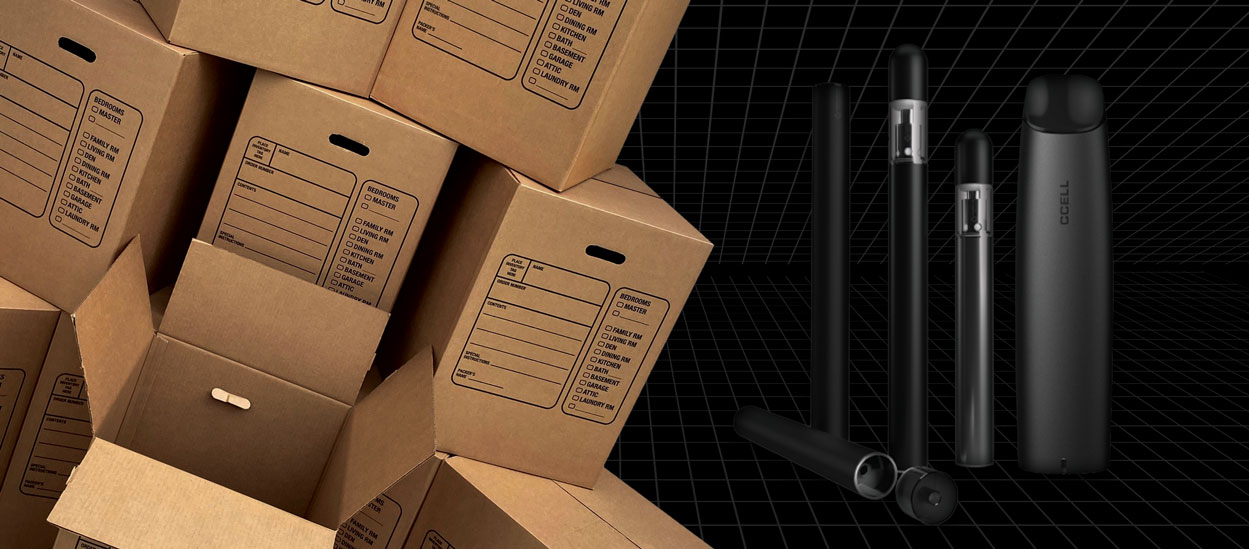The 2021 PACT Act amendment introduced a blanket “Vape mail ban”, which had non-nicotine vape sellers reassessing their business and operations
In December 2020, amid the Covid-19 relief bill, Congress amended the Prevent All Cigarette Trafficking (“PACT”) Act to include a new law called the Preventing Online Sales of E-Cigarettes to Children Act.
As a result of this amendment, all vape companies, nicotine and non-nicotine alike, are prohibited from shipping their vape products via the United States Postal Service (USPS), with all major US parcel carriers such as UPS, DHL and FedEx having agreed to honor the PACT Act.
WHAT EXACTLY IS THE PACT ACT?
The PACT Act originated as far back as 1949 through the Jenkins Act, a federal law stating that any person who sells and ships cigarettes across state borders must report the sale to the buyer’s state tobacco tax administrator.
In 2009, lawmakers amended the act to broaden the regulatory language to include online sales. Online sellers of tobacco products were required to register with the Bureau of Alcohol, Tobacco, and Firearms (ATF) and the state they are operating and selling to. The 2009 amendment prohibited mail delivery for cigarettes and smokeless tobacco within the nation.
In 2020, as part of a larger stimulus bill, the PACT Act was yet again amended to include all Electronic Nicotine Delivery Systems (“ENDS”) and substances that can be used with ENDS to be held to the same regulatory framework as cigarettes and smokeless tobacco products. As per the legislation, ENDS is broadly defined as “any electronic device that, through an aerosolized solution, delivers nicotine, flavor or any other substance to the user inhaling from the device.” Initially, lawmakers created the law to keep nicotine products from the reach of minors and children. However, the legislation was written so broadly that other industries with vape products, such as THC, CBD and other non-nicotine liquids were placed in an uncomfortable position of also having to comply with a statue intended to regulate tobacco.
The new legislation was supposed to go into effect on April 26th, 2021. However, on April 19th, 2021, a week before the implementation, USPS stated that they would postpone the deadline until they could clarify the guidelines. Despite the continued delay in enforcement, other major shipping providers still refused to open their doors to the vaping industry, causing business owners finding themselves planning to find alternatives.
ADDITIONAL TAX WOES IN THE INDUSTRY
The newly amended PACT Act requires vape device sellers to report compliance with state tobacco and nicotine taxes, which businesses selling non-nicotine products like CBD or THC may have to register with the ATF to meet the new requirements. In some states, retailers and producers may have to pay taxes that apply to both tobacco and cannabis business or face fines of $5,000 to $10,000 per month if they fail to comply.
However, some argued that the licensing and taxes do not apply to sellers of non-nicotine vape products. Some states have already defined the separation between vaping devices for nicotine and non-nicotine products.
For example:
- California’s Department of Tax and Fee Administration explicitly excludes legal THC and CBD products and devices for their use from its state tobacco tax laws.
- New Mexico defines e-liquids as substances intended for e-cigarettes, no including those containing cannabis or oil derived from cannabis.
- Oregon’s Department of Revenue subjects vape devices to the state’s tobacco tax scheme, excluding those for the purpose of consuming cannabis products.
Among the more than a dozen letters from producers and manufacturers to the USPS earlier this year on the PACT Act, one argues that interpreting the act to apply to non-nicotine devices would “create a confusing and unnecessary conflict with state law through its amendments to PACT.”
THE FUTURE OF POST-PACT ACT FOR THE INDUSTRY
With USPS and other public carriers including FedEx, UPS, and DHL are taken out of the equation for shipping, many private carrier companies are stepping in to fill in for the position. However, with the lack of national presence compared to public carriers, the cost of service is on the higher price point. Some businesses are looking at specialized third-party logistics companies, also known as 3PLs, which have stitched together a regional carrier network to ensure a nationwide coverage.
With the online sales platform being on a standstill, some businesses rely more heavily on the retail and distribution network to ensure products are still accessible to consumers in the local markets.
The following months may still be uncertain, but every business owner understands that change is always a constant in the cannabis industry and is ready to ride the wave. Many are taking actions by following the guidelines to comply with the new regulation and compliance while reassessing their operational strategy to lessen the impact of the PACT Act.
About Canna Brand Solutions
Canna Brand Solutions is an innovative custom packaging supplier and an official CCELL Distributor. We are a wholesale cartridge, battery, and packaging supplier, and more. Our passion to build lasting relationships with our partners motivates us to exceed your expectations, helping you grow your brand in this ever-evolving global industry.
With our deep experience in manufacturing and the cannabis industry, we offer adaptive custom packaging solutions, in-house design, and industry expertise to Cultivators, Extractors, Operators & Retailers.






